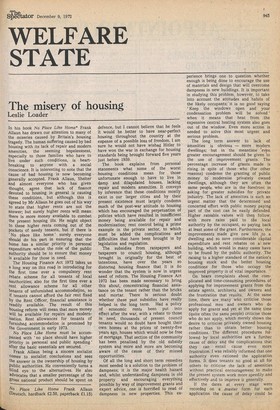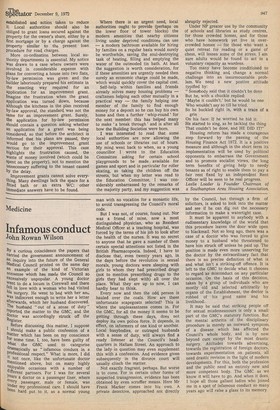The misery of housing
Leslie Loader
In hin book No Place Like Home* Frank Allaun has drawn our attention to many of the miseries caused by Britain's housing tragedy. The human suffering caused by bad housing with its lack of repair and modern amenities, the seeming hopelessness, especially to those families who have to live under such conditions, is heartbreaking to anyone with a social conscience. It is interesting to note that the cause of bad housing is now becoming generally accepted. Frank Allaun, Shelter and almost everyone who has given thought, agree that lack of finance devoted to housing in general is causing these conditions, but although this is agreed by Mr Allaun he goes out of his way to state that higher rents are not the answer; but surely higher rents will mean there is more money available to combat the present housing ills. He might object to these higher rents coming out of the Pockets of needy tenants, but if there is 'No place like home ' surely everyone Should do his part in ensuring that the home has a similar priority in personal expenditure whilst the role of the public authority Should be to ensure that money iS available for those in need.
The Housing Finance Act 1.972 takes us a long way on this road in introducing for the first time ever a compulsory rent rebate scheme for all tenants of local aauthorities; also for the first time ever a rent allowance scheme for all other tenants of unfurnished accommodation, so if tenants cannot afford the fair rent fixed by the Rent Officer, financial assistance is readily available. The result of this housing reform will mean that more money Will be available for repairs and modernAsation. Rent allowances for tenants of furnished accommodation is promised by the Government in early 1973.
No Place Like Home must be accompanied with 'no place should have higher Priority in personal and public spending' after the basic essentials are secured. • Frank Allaun being a sincere socialist comes to socialist, conclusions and sees the answer in the ownership of housing by Public authorities. He conveniently turns a blind eye to the alternatives. He also advocates that a smaller percentage of the gross national product should be spent on defence, but I cannot believe that he feels it would be better to have near-perfect housing throughout the country at the expense of a possible loss of freedom. I am sure he would not have wished Hitler to have won the war in exchange for housing standards being brought forward five years just before 1939. The book explains from personal statements what some of the worst housing conditions mean for those unfortunate enough to have to live in damp and dilapidated houses, lacking repair and 'modern amenities. It conveys by inference that these conditions mostly exist in our larger cities and by their present existence must largely condemn much of the post-war attitude to housing which has encouraged the perpetuation of policies which have resulted in insufficient money being available for repair and modernisation; rent control being a prime example in the private sector, to which must be added the complications and difficulties that have been brought in by legislation and regulation.
The subsidies from ratepayers and taxpayers to council housing, although brought in originally for the best of intentions, have over the years so distorted housing finance that it is no wonder that the system is now in urgent need of reform. The Housing Finance Act 1972 has been made necessary to bring this about, concentrating financial assistance on the tenant rather than the bricks and mortar. There is serious doubt whether these past subsidies have really helped in the long term. Had a policy of economic rents been put into effect after the war, .with a rebate to those in need, thousands of present council tenants would no doubt have bought their own homes at the prices of twenty-five years ago, houses which would now be free of mortgage. That section of the community has been penalised by the old subsidy system and more and more are becoming aware of the cause of their missed opportunities.
Of all the long and short term remedies most needed is a solution to the problem of dampness; it is the major health hazard and, whilst understanding dampness in old property and encouraging everything possible by way of improvement grants and expert advice, one is' horrified to read of dampness in new properties. This ex
perience brings one to question whether enough is being done to encourage the use of materials and design that will overcome dampness in new buildings. It is important in studying this problem, however, to take into account the attitudes and habits of the likely occupants; it is no good saying Keep the windows open and your condensation problem will be solved ' when it means that heat from the expensive central heating system also goes out of the window. Even more action is needed to solve this most urgent and serious problem.
The long term answer to lack of amenities is obvious — more modern dwellings; but in the meantime 'even greater encouragement should be given to the use of improvement grants. The percentage, increase of grants made is rising in spite of those who (for other reasons) condemn the granting of public money to' modernise privately ow,ned dwellings, although they are often the same people who are in the forefront in asking for greater subsidies for private industry. The lack of amenities is such an urgent matter that the determined and concerted effort with public money paying part of the cost can be easily defended. Higher rateable values will theq follow, with more rates paid to the local authority by the occupant, so paying back at least some of the grant. Furthermore, the improvements made give new life to a dwelling and so save considerable chpital expenditure and rent rebates on a. new building, which would in many cases have to be found by the public authority. The raising to a higher standard of the nation's housing stock and the better housing conditions for those who occupy the improved property it of vital importance.
On hears complaints about the complicated and time-consuming procedures of applying for improvement grants from the estate agents, architects and owners and the frustration that results. At the same time, there are, many who criticise those professional men and owners who do apply for grants and yet at the same time (quite often the same people) criticise those who do not apply, which merely shows the desire to criticise privately owned housing rather than to obtain better housing conditions. The different procedures followed by local authorities are a further cause of delay and the complications that they can entail cause even more frustration. I was reliably informed that one authority even rationed the application forms. It does tenants no good at all for others to criticise the lack of amenities without practical encouragement to make the present system work more speedily and effectively and to improve it generally. If the dates at every stage were recorded on a master form for each application the cause of delay 'could be
established and action taken to reduce it. Local authorities should also be Obliged to grant loans secured against the property for the owner's share, either by a first mortgage or by a charge against the Property similar to the present loan Procedure for road, charges.
More co-ordination between local authority 'departments is essential. My notice Was drawn to a case where owners were involved in considerable expense with Plans for converting a house into two flats, by-law permission was given and the builder laboriously prepared his estimate in the exacting way required for an application for an improvement grant. Imagine the frustration when the grant application was turned down, because although the kitchens in the plan received by-law approval, the standard was not the same for an improvement grant. Surely, the application for by-law permission Should contain a question asking whether an application for a grant was being considered, so that before the architect is informed that his plans are passed, they would go to the improvement grant section for their approval. This case highlights the frustration caused, the Waste of money involved (which could be spent on the property), not to mention the Unnecessary suffering to the tenant caused by the delay.
Improvement grants cannot solve everything. Many dwellings lack the space for a .fitted bath or an extra WC: other immediate answers have to be found.
Where there is an urgent need, local authorities ought to provide (perhaps on the lower floor of tower blocks) the modern amenities that nearby citizens living under deprived conditions can use — a modern bathroom available for hiring by families on a regular basis would surely be worthwhile, saving the soul-destroying task of heating, filling and emptying the water of the outmoded tin bath. At least the suggestion is worth consideration, for if these amenities are urgently needed then surely an economic charge could be made, which would quickly cover the capital cost.
Self-help within families and friends already solves many housing problems — craftsmen helping each other mutually in a practical way — the family helping one member of the family to find enough money for a deposit so he can buy his own home and then a further 'whip-round' for the next member: this has helped many to make 'a break through' and is after all how the Building Societies were born.
I was interested to read that some local authorities are now allowing the use of schools or libraries out of hours. My mind went back to when, as a young councillor I wrote to the Education Committee asking for certain school playgrounds to be made. available for games and sport and in particular for roller skating, so taking the children off the streets, but when my letter was read to the Education Committee, I was considerably embarrassed by the remarks of the majority party, and my suggestion was abruptly rejected.
Under NP greater use by the community of schools and libraries as study centres, for those crowded homes, and for those who have homework yet live in overcrowded homes — for those who want a quiet retreat for reading or a game of chess, will lessen some of the stress. I am sure adults would be found to act in a voluntary capacity as wardens.
Too many have become conditioned to negative thinking and, change a normal challenge into an insurmountable problem. We need a new postive attitude typified by: "Somebody said that it couldn't be done But he, with a chuckle replied: 'Maybe it couldn't,' but he would be one Who wouldn't say so till he tried.
So he buckled right in, with a trace of a grin
On his face: If he worried he hid it: He started to sing, as he tackled the thing That couldn't be done, and HE DID IT!"
Housing reform has made a courageous step forward by the passing of the Housing Finance Act 1972. It is a positive measure and although in the short term its implementation will be used by political opponents to embarrass the Government and to promote socialist views, the long term benefits of giving help to needy tenants as of right to enable them to pay a fair rent fixed by an independent Rent Officer will be seen to be real progress. Leslie Loader is Founder Chairman of a Southampton Area Housing Association.











































 Previous page
Previous page